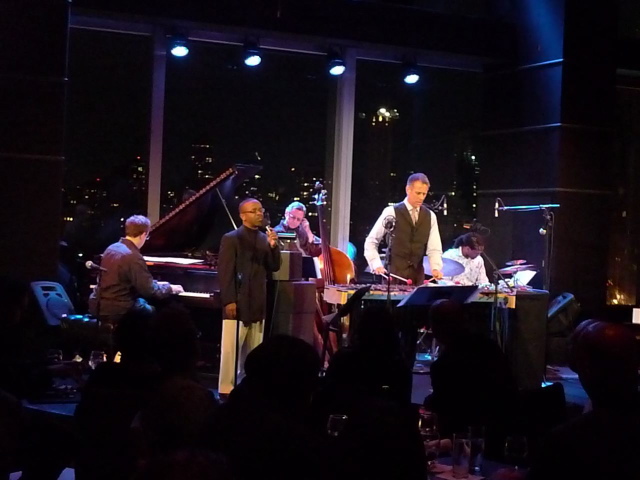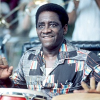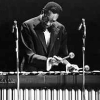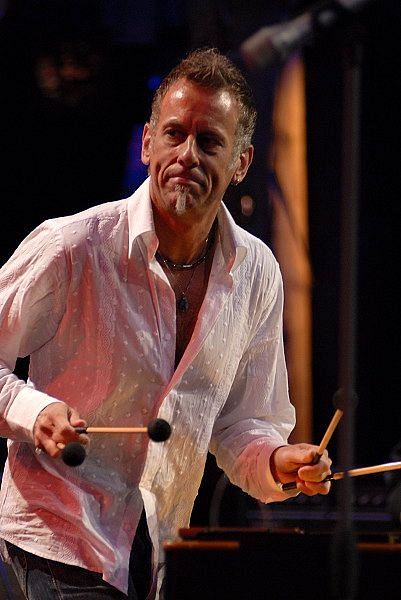Home » Jazz Articles » Interview » Joe Locke: Versatile Vibes Master
Joe Locke: Versatile Vibes Master

Rufus Harley
woodwinds1936 - 2006

Is it broad enough to welcome its first virtuoso glockenspielist... glockenspieler? ... glockenspielarian? Alas, the world may never know. Nearly four decades ago the glockenspiel was proposed to a budding musician in western New York State—a suggestion that oddly, but fortuitously, resulted in the young man taking up the vibraphone. The jazz gods work in mysterious ways. (
Lester Young
saxophone1909 - 1959
Locke says the glockenspiel idea was one that came out of the blue from his mother. "You know in a marching band there's the person that plays the glockenspiel? The glockenspiel is like the xylophone, but it's kind of like a harp. You march with it and you've got the big hat with the feather in it. And you play this marching xylophone. It's like marching orchestra bells. In the hierarchy of [high] school, at the top you had the jocks, then you had the cool kids, the freaks, the hippies. Then you had the smart kids, the chess club. Then at the bottom, you had the nerds, right? Under the nerds you had the glockenspiel player in the marching band," he recalls with laughter. "The nerds would kick his butt after school."
"My mother, for some reason, thought it would be really cool if I played the glockenspiel. She came into my room one day and said, 'Joe. I saw an ad in the newspaper for a vibraphone. I think that's something like a glockenspiel. Let's go have a look at it.' It was a Jenco vibraphone for $200, which is unbelievable. Vibes at that time cost at least a few thousand dollars. We brought that vibraphone home. It sat in my room for a year. I didn't know what to do with it. Then one day I just started playing it and I never stopped."
The rest is part of history, but there is more to be written as the year go on for the talented, self-taught Locke—twice decorated by the Jazz Journalists Association as the outstanding player on his instrument. He had some training in classical percussion and composition through a high school preparatory program at the Eastman School of Music in Rochester, New York, where he lived. But he didn't go on to attend Eastman and didn't get any kind of help figuring out the vibes. Regardless, Locke was playing professionally at the age of 15 and would soon be out on the road as a fulltime working musician.
Locke is a natural on the instrument, an outstanding improviser with great melodic and harmonic sensibility. He has more than 25 recordings as a leader and appears on more than 100 others as a sideman. The setting can be fusion, mainstream and most anything in between, who listened to progressive rock and fusion like 
Weather Report
band / ensemble / orchestra
Return to Forever
band / ensemble / orchestra
Kenny Washington - Vocals
vocals
b.1957
Geoffrey Keezer
keyboards
b.1970
Released in January, 2010, For the Love of You is a sparkling album that combines straight-ahead jazz with some groove-oriented, R&B-like numbers. It was designed with Washington, not to be confused with drummer Kenny Washington, in mind.
 Says Locke, "A few years ago I walked into a venue on the west coast, in the bay area. I walked into this club to hear some music and hang out and Kenny was singing. I was knocked out. I said to myself that I really wanted to work with this guy."
Says Locke, "A few years ago I walked into a venue on the west coast, in the bay area. I walked into this club to hear some music and hang out and Kenny was singing. I was knocked out. I said to myself that I really wanted to work with this guy."
Locke had done a project involving the music of 
Henry Mancini
composer / conductor
1924 - 1994
Johnny Mandel
arranger
b.1925
Last year, Locke was approached by E1 music about making a recording. He had just finished doing a week with Washington and the band—
George Mraz
bass
1944 - 2021
Clarence Penn
drums
b.1968
 From left: Geoffrey Keezer, Kenny Washington, George Mraz Joe Locke, Clarence Penn
From left: Geoffrey Keezer, Kenny Washington, George Mraz Joe Locke, Clarence Penn
"It came out of doing the Mancini music and the film music. So you'll see on the record we have a Mancini tune, a Mandel tune, a Morricone tune," Locke says. "Then we didn't have to stick with that concept. So I added some original music of my own—a vocal tune, which I wrote words and music to, that's a tribute to the late saxophonist 
Bob Berg
saxophone
1951 - 2002
The rhythm section throughout is stellar, with Mraz and Penn providing all the right feels, and Keezer expertly coloring every nuance and providing his own bright, inventive solos. The band gets to stretch out on Locke's instrumental, "Bright Side Up," and it's outstanding. Washington's voice is supple enough for jazz and indeed has a strong R&B feel. It's a recording that will bring his name into more conversations, and justifiably so. The fact that he worked with this band, not just a singer brought into a studio, shows in the cohesiveness of the music.
"It's not all swinging. The Isley Brothers and Neil Young stuff is more groove-oriented. But the focus is on swinging and pretty ballads," says Locke, an upbeat, effervescent guy with an easy manner and a generous soul. "Although the cats in the band bring such a personal thing to the music. If you listen to 'Old Devil Moon,' part of it very in-the-pocket swinging. It's a tune that has been done many times, but there's an energy in the track, with the arrangement, the vibes and piano and fourths, that has the vibe of a 
Bobby Hutcherson
vibraphone
1941 - 2016
McCoy Tyner
piano
1938 - 2020
"On some of the tunes the whole thing is to play pretty. Bring some beautiful music to the table and play pretty. I think there's always room for that... This is a more traditional project for me, but I really dig it and I feel happy to have had the opportunity to do it. It's nice to be able to express all the different aspects of one's personality. I love to write original music, but I love the Great American Songbook. I love to play unusual forms and contemporary music, but I love to swing out too. I'm pretty lucky. I've had the opportunity to do a lot of different stuff."
The group has since done another week at Dizzy's and has a few others dates on the horizon. For Locke and Keezer it marks the continuation of a musical relationship that goes back about 18 years. "We've had an ongoing musical friendship for a while now. We've played in so many contexts... He's one of my absolute favorite musicians, period."
 The two play duet gigs on occasion, have co-led quartets and, with saxophonist
The two play duet gigs on occasion, have co-led quartets and, with saxophonist 
Tim Garland
clarinet, bass
b.1966
Cecil Taylor
piano
1929 - 2018
Dizzy Gillespie
trumpet
1917 - 1993
Pepper Adams
saxophone, baritone
1930 - 1986
Mongo Santamaria
percussion
1917 - 2003
Grover Washington, Jr.
saxophone
1943 - 1999
Kenny Barron
piano
b.1943
Dianne Reeves
vocals
b.1956
Eddie Henderson
trumpet
b.1940
Mingus Big Band
band / ensemble / orchestra
"The vibraphone was right in between the two instruments and satisfied both urges, the rhythmic urge and the melodic urge. I found my voice. I found the vibraphone when I was 13. There was no looking back," he says. His high school had no music program, but that didn't stop Locke.
 "I was listening to Return to Forever. I was listening to my older brother's records—Cream, Santana, Jefferson Airplane, Procol Harem, Hendrix, Paul Butterfield and all that stuff. I was listening to Weather Report and
"I was listening to Return to Forever. I was listening to my older brother's records—Cream, Santana, Jefferson Airplane, Procol Harem, Hendrix, Paul Butterfield and all that stuff. I was listening to Weather Report and 
Mahavishnu Orchestra
band / ensemble / orchestra
b.1971
Art Blakey
drums
1919 - 1990
Wayne Shorter
saxophone
1933 - 2023
Lenny White
drums
b.1949
Joe Henderson
saxophone
1937 - 2001
One of his close friends, Joey Currazato, an alto saxophonist who died in 2009, was also instrumental in his music education. "He was like a jazz library. His apartment was chock-full of recordings. I could go over there and listen to music for eight hours at a time. He turned me on to everybody from 
Donald Byrd
trumpet
1932 - 2013
Howard McGhee
trumpet
1918 - 1987
Sonny Clark
piano
1931 - 1963
Art Farmer
flugelhorn
1928 - 1999Pony Poindexter
b.1926
Eric Kloss
woodwinds
b.1949
Hadley Caliman
saxophone
1932 - 2010
He adds, "The first record I heard to turn me on to what I considered the real pure jazz stuff was a 
Jackie McLean
saxophone, alto
1932 - 2006
Lee Morgan
trumpet
1938 - 1972
Hank Mobley
saxophone, tenor
1930 - 1986
Miles Davis
trumpet
1926 - 1991
Jimmy Cobb
drums
1929 - 2020
Wynton Kelly
piano
1931 - 1971
Cannonball Adderley
saxophone
1928 - 1975
The first album he heard with vibes was 
Mike Mainieri
vibraphone
b.1938
Gary Burton
vibraphone
b.1943
Milt Jackson
vibraphone
1923 - 1999
Dave Pike
vibraphone
b.1938
Lem Winchester
vibraphone
1928 - 1961
Terry Gibbs
vibraphone
b.1924
After avoiding the glockenspiel, two years of figuring out the vibraphone in the meantime and starting to absorb jazz, he was playing around Rochester at the age of 15. "After I graduated from high school I got a call to go on the road with a cat named Spider Martin, who was a tenor player in the area and a working band leader. So when I was 17 I started playing professionally, traveling and touring, getting a chance to play a record. He would bring in guests for tours and recording like Pepper Adams, 
Jimmy Owens
trumpet
b.1943
Billy Hart
drums
b.1940
Jack McDuff
organ, Hammond B3
1926 - 2001
Richard "Groove" Holmes
organ, Hammond B3
1931 - 1991
Jimmy McGriff
organ, Hammond B3
1936 - 2008
 In addition to getting road experience, there were other encounters that further his education. "I had the luxury of getting to do some concerts with Dizzy and listen to him tell stories," Locke notes. "I even had the opportunity, on a couple occasions, to sit with him at the piano and have him talk to me about harmony and how improvisation was all about knowing chords and the permutations of chords. I had the opportunity to room with Mongo Santamaria on some of the gigs. I used to hear great stories about his experiences as a bandleader. When I moved to New York, when I was 20 or 21, one of the first calls I got was from
In addition to getting road experience, there were other encounters that further his education. "I had the luxury of getting to do some concerts with Dizzy and listen to him tell stories," Locke notes. "I even had the opportunity, on a couple occasions, to sit with him at the piano and have him talk to me about harmony and how improvisation was all about knowing chords and the permutations of chords. I had the opportunity to room with Mongo Santamaria on some of the gigs. I used to hear great stories about his experiences as a bandleader. When I moved to New York, when I was 20 or 21, one of the first calls I got was from 
Walter Davis Jr.
piano
1932 - 1990
 "I had the opportunity to tour with Cecil Taylor. That was an amazing thing to play with Cecil and get inside his process. I feel like I've been real fortunate to have experiences wide in scope. Before I moved to New York or before I started playing music I would have thought this stuff was beyond my wildest dreams. So when I look back, I feel like a pretty lucky guy... I've learned from everyone I've played with. Not only the elder statesmen, but from my peers. And now from players much younger than me I'm learning a lot," he says with an unforced humility."
"I had the opportunity to tour with Cecil Taylor. That was an amazing thing to play with Cecil and get inside his process. I feel like I've been real fortunate to have experiences wide in scope. Before I moved to New York or before I started playing music I would have thought this stuff was beyond my wildest dreams. So when I look back, I feel like a pretty lucky guy... I've learned from everyone I've played with. Not only the elder statesmen, but from my peers. And now from players much younger than me I'm learning a lot," he says with an unforced humility."
The process goes on for Locke, as it does all working musicians. In addition to the project surrounding his new CD, Locke also has his working band Force of Four, which will be touring this year. "It's very, very close to my heart. Robert Rodriguez on piano, 
Johnathan Blake
drums
He continues to get calls to participate on projects of other musicians, lending his special touch, personal sense of swing and creative story-telling to whatever the situation.
"I can't complain," says Locke, who seems as though he wouldn't even given good reason. "So, onward and upward, man."
That's a direction Locke, no doubt, should be taking for some time to come.
Selected Discography
Joe Locke, For the Love of You (E1 Music, 2010)
Joe Locke, em>Mutual Admiration Society (Sharp Nine, 2009)
Edmar Castaneda, Entra Cuerdas (ArtistShare, 2009)
Joe Locke/Frank Kimbrough, Verrazano Moon (OmniTone, 2008)
Hadley Caliman, Gratitude (Origin, 2008)
Trio da Paz & Joe Locke, Live at Jazz Baltica (MaxJazz, 2008)
Joe Locke, Force of Four (Origin Records, 2008)
Joe Locke, Re-velation: The Music of Milt Jackson (Sharp Nine, 2005)
Joe Locke, Live in Seattle (Origin, 2006)
Joe Locke/Geoffrey Keezer Group, Summertime (SONY Music/Eighty-Eights, 2005)
Joe Locke/Geoffrey Keezer Group, The Summer Knows (Sirocco, 2004)
Joe Locke & Four Walls of Freedom, Dear Life (Sirocco, 2004)
Joe Locke, Beauty Burning (Sirocco, 2000)
Joe Locke, Slander and Other Love Songs (Milestone, 1998)
Joe Locke, Inner Space (Steeplechase, 1996)
Joe Locke Quartet, Moment to Moment: The Music of Henry Mancini (Milestone, 1995)
Joe Locke, But Beautiful (Steeplechase, 1991)
Joe Locke, Present Tense (Steeplechase, 1990)
Joe Locke, Restless Dreams (Chief Records, 1983)
Photo Credits
Page 1: Alexandros Lambrovassilis, Courtesy of Joe Locke
Page 2: Russ Titelman, Courtesy of Joe Locke
Pages 3, 4: Kay-Christian Heine
Tags
Comments
PREVIOUS / NEXT
Support All About Jazz
 All About Jazz has been a pillar of jazz since 1995, championing it as an art form and, more importantly, supporting the musicians who make it. Our enduring commitment has made "AAJ" one of the most culturally important websites of its kind, read by hundreds of thousands of fans, musicians and industry figures every month.
All About Jazz has been a pillar of jazz since 1995, championing it as an art form and, more importantly, supporting the musicians who make it. Our enduring commitment has made "AAJ" one of the most culturally important websites of its kind, read by hundreds of thousands of fans, musicians and industry figures every month.






 Buy Now
Buy Now























